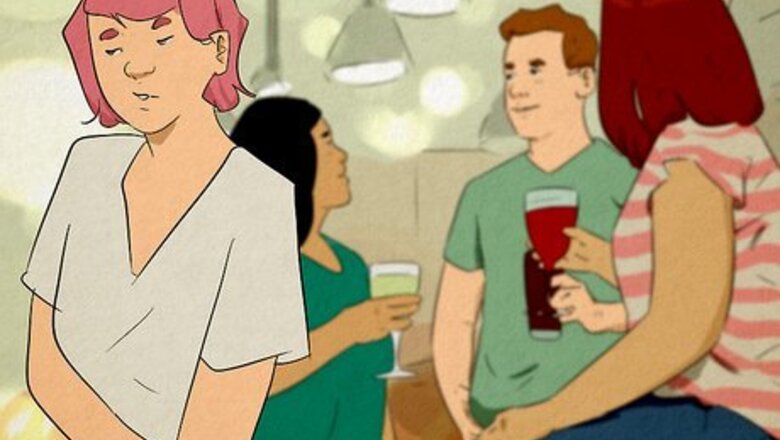
views
- Social awkwardness is often the cause of many “weird” feelings—things like fumbled speech, closed-off body language, or off-color humor.
- People find anything that’s unfamiliar or new weird, like special interest hobbies, flamboyant or striking style, or unconventional religious or spiritual beliefs.
- Ask yourself if your weirdness is harmful, or just different, and surround yourself with people who are similarly different to feel more at-home in social situations.
What makes someone weird?
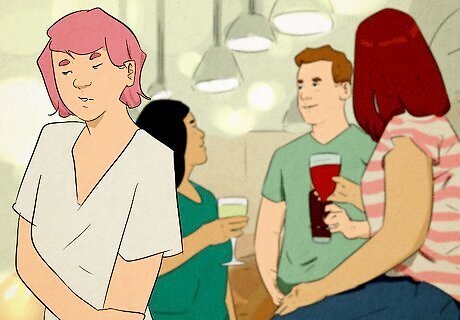
Social awkwardness It’s a broad umbrella, but it’s the most common culprit of what qualifies as “weird.” Introversion, shyness, fumbling conversations—it can all have the undesired effect of throwing other people off their own grooves and pushing them away. The good news is, these are all things you can work on and improve—if you want to, that is. This is one cause of “weirdness” that we’ll tell you right now not to worry too much about. Everyone clicks with different people, and social awkwardness is often just a matter of personal taste. That said, if you want to “improve” your social skills, focus on more individual entries in this list. Social awkwardness isn’t always something to “cure,” but tweaking certain behaviors can help make you more approachable.

Awkward body language Examples of “weird” body language include shifting eyes or lack of eye contact, hunching, crossed arms, restless legs, or letting your face reveal emotions you meant to hide. These are sometimes signs that other people read as distress or discomfort, even if you only do them out of habit, or because they feel natural. Try maintaining eye contact, using your hands to gesture, standing with your shoulders facing the person you’re talking to, and breathing deep, steady breaths to keep your body language open and friendly. If it helps, practice doing just one of these at a time, and add the others individually as you get the hang of them.

Having an unconventional appearance It’s not always pretty, but humans are aesthetic creatures. We value looks and appearances, often to our detriment. If you have an unconventional appearance—wacky hair, uncommon facial features, peculiar taste in fashion—the hard truth is that some people will write you off as “weird until proven normal.” While you ought to take care of your hygiene and respect those around you, your natural features or fashion choices are part of what make you, you, and you should never feel ashamed for them.
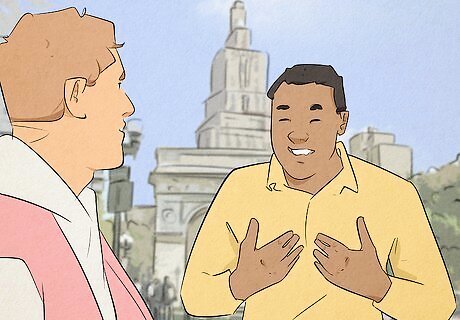
Having an off-color sense of humor Developing a sense of humor is just one of the ways people bond and show each other that it’s safe to let our guards down. But if you have an alternative sense of humor—whether it’s overly dark, dry, deadpan, or anything else—others may have trouble connecting with you, and put their guards up instead. Ask yourself or a friend if your humor is insulting or puts others on edge in any way. Do you often reference taboo topics that others might not be comfortable with? If your humor is offensive, it might be best to hedge it in; you won’t win any comedy contests with people who feel hurt by your jokes. Otherwise, it’s a matter of finding your audience. You might save your humor for people who “get it,” and fall back on things like questions or active listening in conversation with those who don’t.
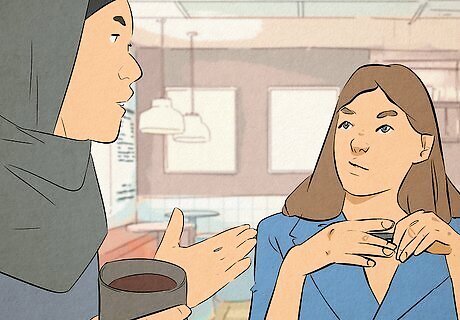
Believing in unconventional things Sometimes a person’s philosophies, religion, or even their perspective brands them as “weird” in other people’s eyes. Maybe you practice a niche spirituality other people find alarming, or believe certain things about how the world works that make you a “downer.” Whatever the case, our personal beliefs are too often walls, not bridges. While you should never hide who you are, it can help to wait for these beliefs to come out naturally in conversation. Once a person knows you better, they may be more receptive to learning how you see the world. For example, you probably shouldn’t try to convert someone to your spirituality on your first, second, or even third meeting. But once you’ve known them a while, you might have an open conversation about both your beliefs.

Having trouble expressing yourself verbally Often, “weirdness” is just a matter of failure to communicate effectively. You say something you don’t mean, or you struggle to verbalize your more abstract emotions, and people short-circuit in response. You’re not alone! People have been struggling to express themselves since before language was invented—and you can imagine how hard it was then. Practice finding your words by writing in a journal each day. Getting the words out of your head and onto the page can help you find and use them when they’re needed on-demand, like in conversations.

Having niche interests Are you big into hobby-horse riding? Or maybe you’ve got an expansive collection of vintage goth paraphernalia. While your lesser-known interests are what adds color to your personal tapestry, close-minded people may find them distasteful. But if we’re being honest, so long as you’re not hurting anyone, that’s their problem. That said, it’s important to connect with people on common ground. If you’re always talking about plate tectonics, for example, people may have trouble finding other ways to connect with you. Foster a healthy curiosity in more common interests—popular music, movies, games, even politics—to help understand others, and find accessible things to talk about.
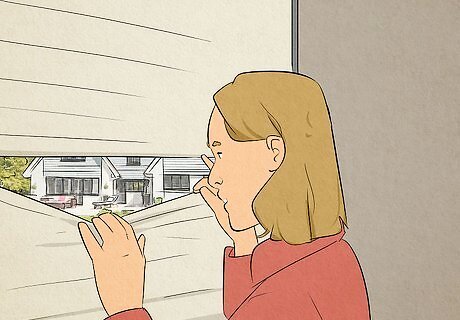
Overlooking other people’s boundaries Some of us are bad at reading body language and respecting things like personal space or emotional boundaries. Everyone has different off-limits behaviors and topics, and sometimes respecting all of them is a job in and of itself, but it’s important to keep trying. When in doubt, ask someone what sort of touching or what conversation topics they might not be comfortable with, so you know to steer clear of them. In most cases, a simple apology is enough to brush it off and continue with your interaction. Say something like, “Oh, sorry, I won’t do that again,” then turn the conversation to safer territory.
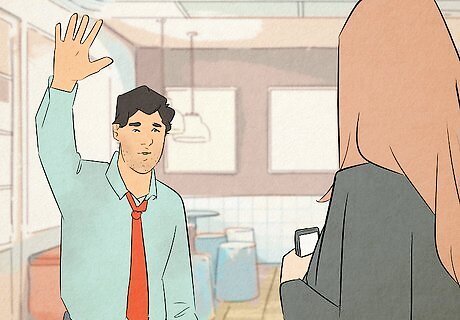
Having poor hygiene Bad hygiene, or neglecting your own personal cleanliness, can turn people off of interactions if it’s notable or distracting. Forgetting to shower one morning is no biggie, but neglecting to shower for a week straight (outside of things like camping) could be a sign to pay closer attention to your body. Practice better hygiene by aiming to shower or bathe with soap and warm water at least once every couple of days. Also, brush your teeth twice a day, and wear deodorant or antiperspirant if you’re concerned with personal body odor. That said, the presence of body hair, crooked or yellow teeth, acne, or other “imperfections” are actually totally natural. If someone takes issue with them, that’s not your problem.
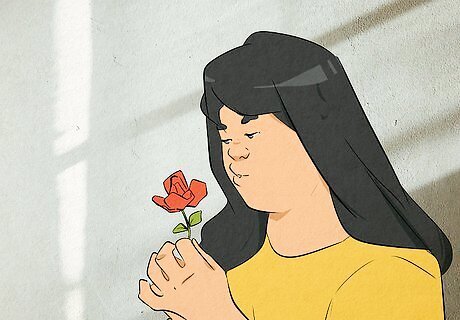
A condition that affects your behavior or appearance Many people have physical, mental, or other conditions that mean they live differently than the “average” person, which unfortunately brands them as “weird.” These include things like visual, hearing, or other impairments, ADHD, autism, or any other condition that causes noticeable differences in behavior. Like many things on this list, these aren’t anything to be ashamed of, and if someone finds them “weird,” that’s a personal matter that they need to work through on their own time.
Adapting Your Behavior

Ask a friend about how they see you. “Weird” is all just a matter of perspective. One person’s ick is another person’s treasure, but it can be hard to see that when you’re worried you’re the ick. Get some third-party advice by asking a close, trusted friend or family member if there’s something about you they think might hold you back from forming personal connections. Be prepared for their honest answer, since you’re asking an honest question. Growth isn’t always comfortable, but it’s often necessary.

Brush up on reading social cues by talking to strangers. Practice makes perfect, and chatting with strangers is the perfect low-stakes activity to help you get more comfortable socializing and communicating with other people. Visit a bar, cafe, or any other social, public setting and start a conversation. Then, see where it takes you! Ask open-ended questions, like, “What brought you to this city?” or, “What do you enjoy doing in your free time?” to kick off conversation and keep it rolling. As you talk, take note of what parts of the conversation make you uncomfortable. Do you not know what to do with your hands, or can’t fill awkward silences? Jot them down as things to work on. Talking with strangers has the added benefit of showing you just how weird pretty much everyone is—not just you.

Mirror other people’s behavior to “blend in.” “ Mirroring” is when you mimic someone else’s behavior or body language. It helps to show that you’re vibing and on the same page, and makes them more comfortable. Next time you don’t know what to do with your body in a conversation, take note of how the other person handles themself, and follow their lead. For example, if they’re sitting back in a relaxed position, relax your own shoulders and feel free to slouch a little, to show them you’re relaxed too. Avoid literally mirroring them, which may come across as odd. Instead, aim to mirror their general disposition or vibe.

Stay kind, polite, and open-minded to override your weirdness. Here’s a secret: you can be the wackiest, zaniest, strangest person in the world, and people will give you a free pass so long as you treat others with respect and kindness. After all, everyone’s different and “weird” to a certain degree, but at the end of the day, it’s the heart that counts. Mind your manners, ask people around you if they need help, and check in on your friends every once in a while.

Visit a therapist if you think you have an undiagnosed condition. Sometimes, “weirdness” is out of our control, and we can’t begin to get to the bottom of it without professional help, especially if it originates from an undiagnosed condition. If your weirdness causes you distress, talk to a therapist or psychologist and explain the situation and how you feel. A licensed professional can help you better understand yourself, and come up with personalized strategies for embracing or altering your behavior.
Embracing Your Weirdness
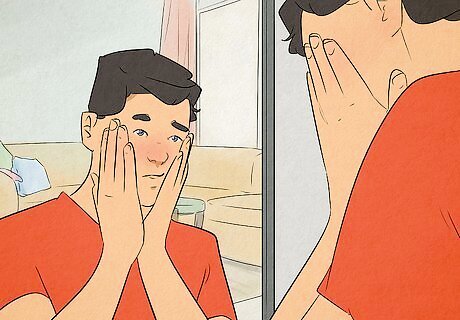
Ask yourself if your weirdness is harmful, or just different. This is key! If you lived how everyone else told you to live, you’d never be happy. A little weirdness is necessary for being you, and you don’t have to change that if it isn’t causing you or anyone else any undue distress. Ask yourself: Does my behavior cause physical harm to the people around me? Does it cause emotional hurt to the people around me? Is that emotional hurt the result of their close-mindedness, or my own behavior? Do other people see and appreciate my quirks? Do my quirks make me happier? Would I trade them for a more peaceful or easier social life?

Forgive yourself for social blunders and other mistakes. We all make the occasional faux pas every now and then, some of us (much) more than others. But if we spend every waking moment thinking about them, how could we ever leave the house again? Remind yourself that people all live busy lives, and if you fumble in front of someone, they’ve probably forgotten it the moment the conversation ended. What's more, remind yourself that social interactions aren’t things to be “won” or things you can get “good grades” in. Also, avoid calling attention to your faux pas. If it interferes with the conversation, a quick, “My bad,” is usually enough to keep things moving.
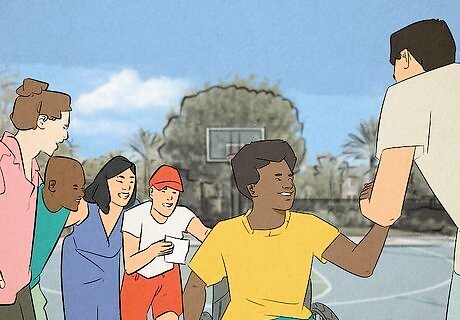
Find a community of like-minded oddballs. Life coach Aïcha Doucouré encourages finding a community of like-minded people to be weird with, whether online or in person. Join a special interest club devoted to your niche hobby, or start a chat channel and advertise it online. You’ll find that there are plenty of other people just like you, and that you’re not so weird after all. Or, join a niche group for something that you’re unfamiliar with to encounter more diverse, unconventional, and unabashed personalities.




















Comments
0 comment